Health and science are evolving together, and exercise science is on the cutting edge of both. Webster students in this program study subjects from kinesiology to biology and develop the practical, specialized knowledge they need for professional success. The exercise science degree provides an excellent academic foundation for students choosing to pursue graduate and professional degrees in multiple health careers, such as exercise physiology, occupational therapy, physical therapy, medicine and athletic training.
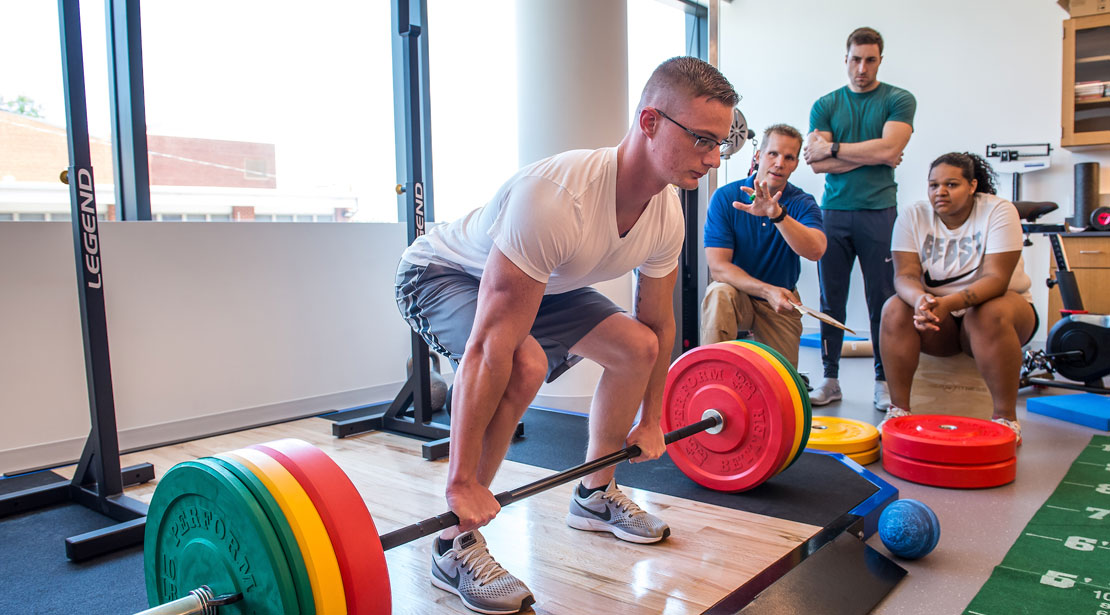
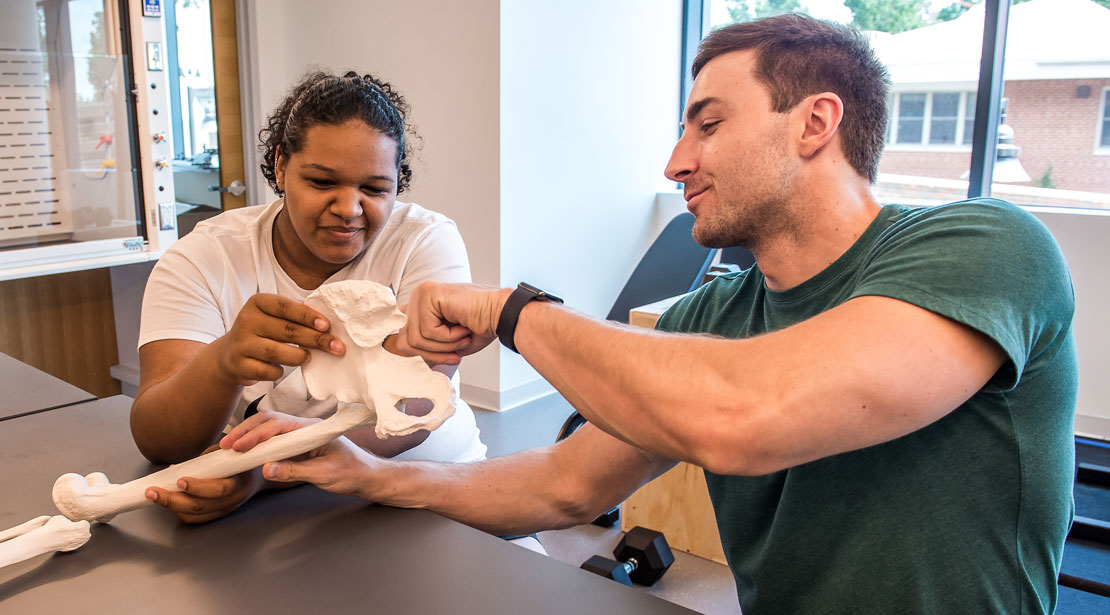
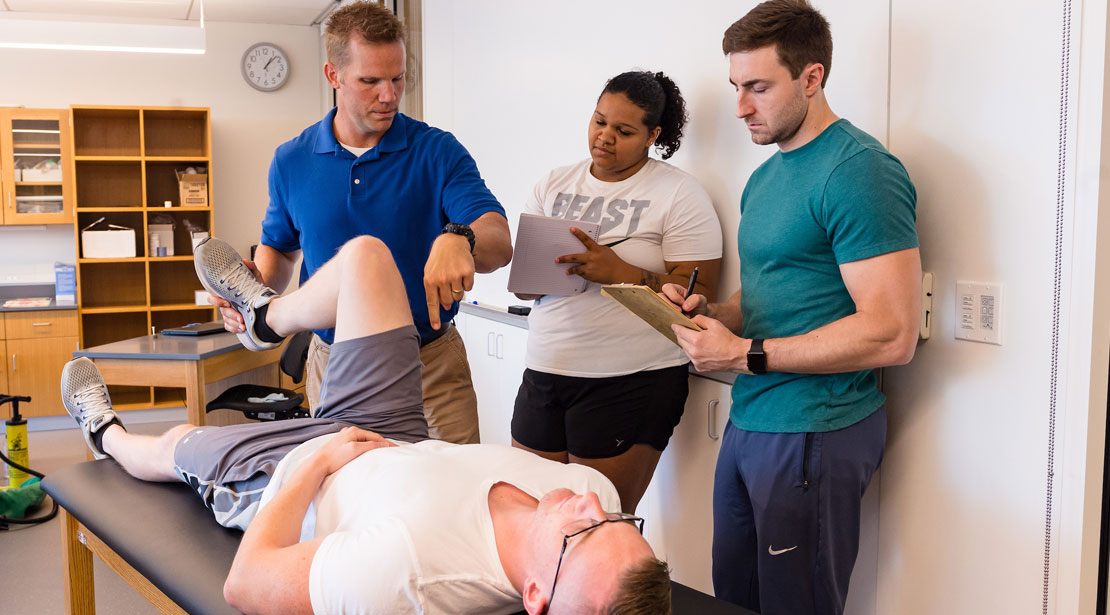
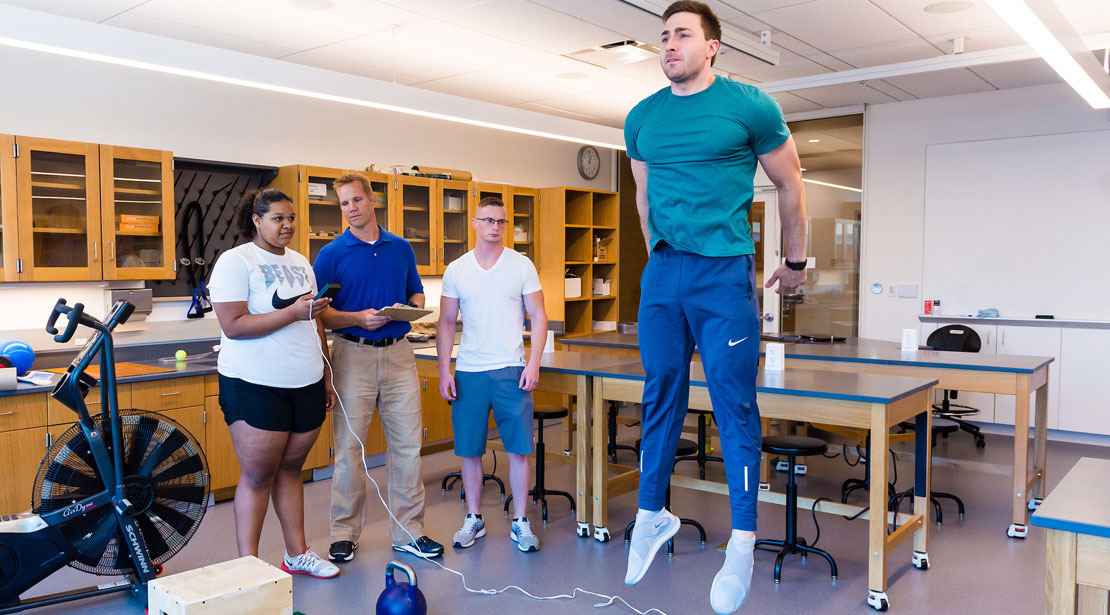
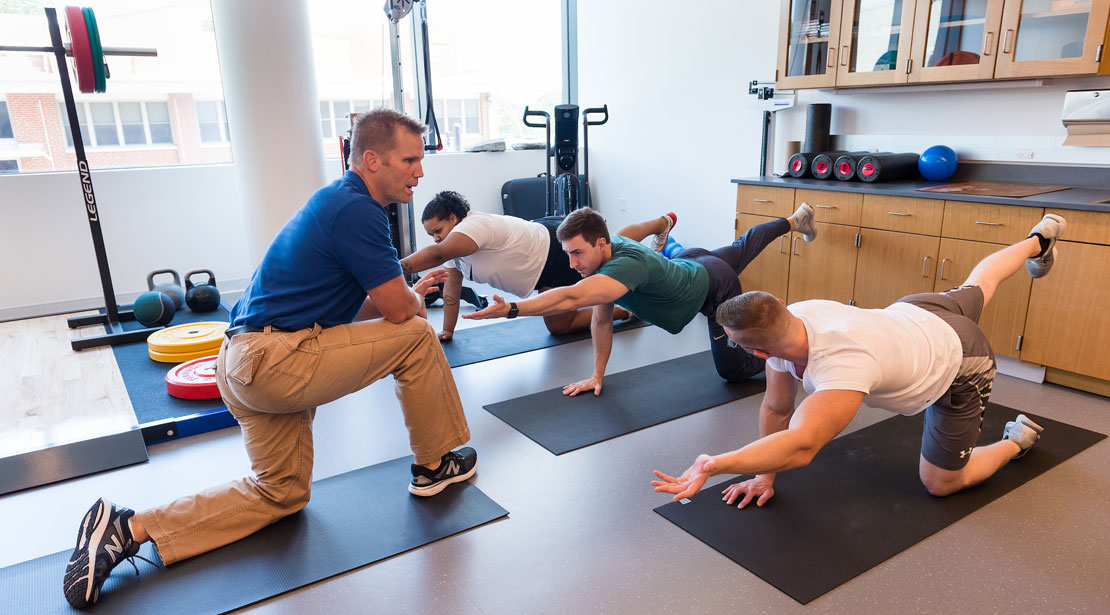
Program Spotlight: Exercise Science (BS)
Learning Outcomes
Upon completion of the exercise science program, students will be able to demonstrate:
- Basic knowledge of biology, chemistry, physics and human movement.
- Knowledge of effective analysis of kinesiology concepts.
- Skill in applied kinesiology, effective use of problem-solving techniques, and intelligent decision-making skills in clinical settings.
- Tolerance and understanding of diverse populations, responsible citizenship, a professional attitude and ethical behavior.
Transcript
[Music]
Text on screen: Program Spotlight: Exercise Science (BS)
[Footage of Browning Hall fades into an interview shot.]
Text on screen: David Reddy, Director, Instructor, Exercise Science
David Reddy: It’s the science of exercise, the science of movement, the science of fitness, the science of health. We are housed in the Department of Natural Sciences and Mathematics, so you're going to get a foundational level of many different sciences.
[A blue filter covers footage of students working in various labs and text scrolls up from the bottom of the screen.]
Text on screen: Biology, Physics, Chemistry, Anatomy and Physiology
Biology, physics, chemistry and then anatomy and physiology. And so it is the undergraduate experience is going to take them on to graduate school or a professional career in and of itself.
[Another blue filter over student footage with text appearing from left to right.]
Text on screen: High-Impact Learning, Engaging Students with Hands-On Practices
[David Reddy demonstrates to students how to use various tools and techniques in the context of physical therapy and exercise training.]
In our labs, we do a lot of work with each other. So we'll assess movement, we'll assess health, we’ll be taking blood pressure, heart rates – there's a lot of high impact, hands-on experiences that are wonderful.
[The demonstrations end as another interview shot appears.]
Text on screen: Nysa G., Student
Nysa G.: My favorite part is the hands-on activities that we do.
[More footage of David Reddy working with students and teaching best practices.]
The exercises, getting to use your own body to kind of go through the movement to help me to better, like, learn things and apply it in real life.
Reddy: Another important feature being housed in the science department is that our students all do a unique senior thesis project.
[Another interview shot of David Reddy changes to footage of students giving presentations on posterboard and in front of an auditorium.]
They put together the study. They do the entire study over the course of a year, and then they write up a paper, they do a presentation, and it's really great to see.
Text on screen: Customized Education, Preparing Students for a Wide Variety of Careers
By the end of almost their first semester – if not, their first year — not only do we know everyone by name, we are beginning to customize what their four-year experience looks like.
[David Reddy continues speaking as texts pops up on screen.]
Text on screen: Job Placement, Internship Opportunities, Graduate School Preparation
So what part-time job might serve them best? Are they going to intern somewhere in particular? If you're going to graduate school, what does that look like? So I think that's from a coaching standpoint, a mentoring standpoint — that's vital.
Text on screen: Tony T.
Tony T.: The internship that I did within this program helped me a lot. Kind of exposes me to a variety of careers and a variety of paths that I could take. Once we tell them, you know, our purpose and our goals and they are willing to kind of shape our path to pursue that.
[The interview footage of Tony T. fades into a Webster Student athlete pitching a baseball.]
Text on screen: Athletics and Academics, Individualized Education for the Student Athlete
Reddy: A lot of our students, inevitably, are student athletes that they're also in athletics playing a variety of sports.
[Footage of Webster’s strength coach and athletic trainer interacting and engaging with student athletes]
Our strength coach, our athletic trainer, they work with the students, with their performance, with their injuries. But they're also adjuncts in the exercise science program. So it's great to see that, that they kind of see both the athletics angle and the academic angle.
Nysa: They make sure that we get what we need while we're here and that we can take things with us so that we can work while we're on the road.
[Footage of various Webster sports: women’s basketball, volleyball, men’s soccer and baseball.]
They work with us with exams, scheduling things. They're very understanding with that. So I've appreciated that.
[Various teachers work with students in Webster’s Department of Natural Sciences and Mathematics.]
I have a good relationship with my professors, which I know will benefit me in the future, and it already has.
[A close up of Nysa smiling at the camera slowly fades to blue.]
So I am happy that I chose Webster.
[Webster University logo animates on screen]
Text on screen: Webster University, webster.edu

“I want to help people become the very best version of themselves. No one deserves to live their life in pain, so being able to help them feel better is what I strive to do.”

BS in Exercise Science, ’24
Bachelor of Science in Exercise Science
Find out more about the overall Exercise Science BS curriculum, electives, learning outcomes and more.
Pre-Occupational Therapy 3-2 Program
Webster University offers a cooperative 3-2 program with the Washington University School of Medicine in Occupational Therapy. This dual degree program enables students to complete a BA in Biology, BS in Biological Sciences, BS in Exercise Science, BS in Psychological Science or BA in Psychology from Webster University and a Master of Science in Occupational Therapy from Washington University within a five-year period. Occupational therapy is a client-centered health profession concerned with promoting health and well-being through occupation. The primary goal of occupational therapy is to enable people to participate in the activities of everyday life.
To take advantage of this cooperative 3-2 program, students need to:
- Complete a minimum of 90 credit hours toward the declared Webster undergraduate degree, with at least 30 of those credit hours taken in residence at Webster University, and two years at Washington University.
- Complete the Webster University global citizenship program and the requirements for their undergraduate major at Webster prior to entering the Washington University program.
- Apply to the Washington University School of Medicine Occupational Therapy Program. Most students apply in early fall of their junior year. Interested students should examine the materials on the Washington University site to make sure they have the most current set of admission requirements.
- Submit a petition to graduate from Webster University upon earning a minimum of 120 credit hours (after year 1 or year 2 at Washington University).
- BIOL 3010 Human Anatomy and Physiology I* (3 hours)
and BIOL 3011 Human Anatomy and Physiology I: Lab* (1 hours) (Life Science, Physiology) - BIOL 3020 Human Anatomy and Physiology II (3 hours)
and BIOL 3021 Human Anatomy and Physiology II: Lab (1 hour) (Physiology) - PSYC 2300 Lifespan Development* (3 hours) (Developmental Psychology)
- PSYC 2750 Introduction Measurement and Statistics (3 hours)
or MATH 2200 Statistics (3 hours)
or STAT 3100 Inferential Statistics (3 hours) (Statistics) - PSYC 3125 Abnormal Psychology* (3 hours) (Abnormal Psychology)
- Social Science Elective (ANSO, ECON, POLT, PSYC) (3 hours) (Social Science)
*Students must meet the required prerequisites for these courses at Webster.
What Can You Do With a BS in Exercise Science?
As an Exercise Science major at Webster, you’ll be qualified to immediately pursue exciting career roles such as:
- Personal Trainer
- Wellness Coordinator
- Strength and Conditioning Coach
- Fitness Trainers and Instructors
Most graduates will continue their education in a specialized post-baccalaureate program after graduation and are employed in a wide range of positions, including:
- Exercise Physiologists
- Kinesiotherapists
- Physical Therapists
- Athletic Trainers
Salaries for Exercise Science Majors
Jobs for exercise physiologists are predicted to increase by 9% through 2034. According to the U.S. Bureau of Labor and Statistics, the median annual wage for exercise physiologists was $58,160 in May 2024. Jobs for athletic trainers are predicted to increase 11% through 2034. Also according to BLS, as of May 2024, the median annual wage for athletic trainers is $60,250.

Other Webster Programs in the Sciences

Get Started on Your Exercise Science Major
Take the next step toward earning your Exercise Science degree. We are here to help you get started.
Explore
Learn more about our academic programs and our main campus and locations.
Engage
Connect with our admissions counselors and academic advisors.
Apply
Apply to Webster and take the next steps for financial aid and scholarships.
Contact the Admissions Office to Find Out More
If you have more questions about the program, your application or other enrollment-related inquiries, contact our Admissions Office.
Call 314-246-7800 or 800-753-6765 or send an email to admit@webster.edu.
